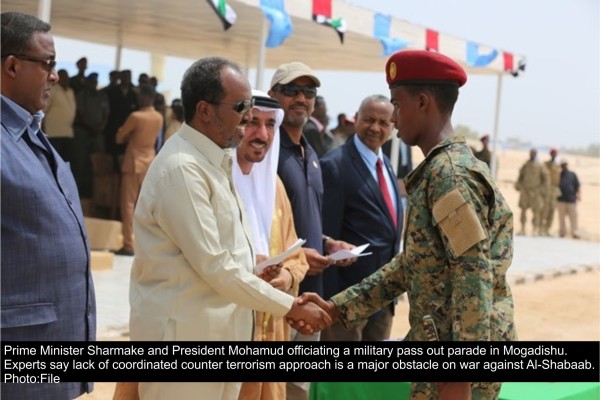Analysis: Lack of dedicated national security policy in Somalia a boon for Al-Shabaab, experts warn

By Roble Ibrahim
Lack of a clear national security framework and inherent corruption among security agencies is to blame for continued attacks by Al-Shabaab in Mogadishu and other parts of the country, experts have warned.
The recent high profile attacks in Mogadishu which claimed upwards of 40 lives in addition to the Dallo airline attack in February are all indicative of a failure on the part of government and foreign force interventions in countering Al-Shabaab strength; former Somali intelligence chief, Ahmed Moalim Fiqi has aid.
“There is no clear policy by the government of Somalia on the fight against Al-Shabaab. They (government) engage in rhetoric while Al-Shabaab takes its operations very seriously,” said Fiqi.
Dependence on Amisom
Fiqi notes that the government is overly dependent on Amisom and other foreign security agencies for intelligence and military firepower with little or no commitment at all in building its own forces. “Here is a government which sits comfortably knowing all too well Amisom will take care of things. The day Amisom will exit is when Somali government will wake up and realise providing security for its people is its prerogative,” noted Fiqi.
Analysts also see the absence of a coordinated approach between the Federal government and the regional administrations as one of the strategic weak points for Somalia in dealing with Al-Shabaab. Mahamed Caalim, a Finish based political and security analyst on Horn of Africa says where as Al-Shabaab has established an integrated intelligence sharing network, the two levels of government operate on their own making it easy for Al-Shabaab to infiltrate.
“The regional administrations are busy trying to seek some sense of autonomy from the centre and that has created a gap in intelligence and resource sharing. Al-Shabaab knows these gaps very well and they take advantage to launch attacks,” said Caalim.

Al-Shabaab, Fiqi says deploys small cells of three to fifteen to carry out massive attacks because of credible intelligence gathering but combined Amisom and Somali security agencies have in a number of cases failed to match this because of lack of a coordinated approach.
Puntland state has for the last one week been battling Al-Shabaab elements suspected to be affiliated to Islamic State for Iraq and the Levant, ISIL. Mogadishu has sent military reinforcements to counter the insurgency.
National Security Policy
A communiqué released during the High Level Partnership Forum in Istanbul, Turkey February called on the Federal government to ensure the National Security Policy is fully agreed on and endorsed before May 2016.
The absence of this policy and the National Security Architecture which the government had indicated it would be put in place before the Instanbul conference is a boon for Al-Shabaab to easily conduct its operations despite local and international security force interventions.
“There is no will and the government has not been committed to setting up a dedicated committee to oversee the operationalisation of the troop’s integration plan,” said Caalim. Without a national policy agenda, the fight against Al-Shabaab is less coordinated, less focused and not bench-marked,” said Caalim.
Airport security
Despite improved security checks in Aden Adde Airport in Mogadishu which now involves use of sniffer dogs, analysts contend the lack of general security framework to tighten loopholes in other aviation facilities in the country could still pose a major threat.
Fiqi observes the incident in Beletweyne airport early this month which saw a laptop carried by a passenger blow up at the entrance of the airport was an indicator of further attempts by Al-Shabaab to launch attacks on airlines.
“The Beletweyne incident was not a standalone. It had a direct bearing to another attack at Ade Adde. My deduction is that Al-Shabaab wanted to sneak in that laptop to Mogadishu airport since the plane would have landed there,” said Fiqi.
Fiqi says Al-Shabaab seeks to isolate Somalia from the rest of the world as it has done in the past and the change of course to target airlines exemplifies this point. Turkey suspended direct flights to Mogadishu following the Dallo airline incident but has since resumed. Nairobi is still the only consistent route which has remained open despite terror attacks, says Fiqi but added another attack on an airline could force Kenya to reconsider cancelling flights to and from Mogadishu.
Entrenched corruption
Somalia was ranked among the most corrupt countries in the world last year alongside North Korea and a UN report in 2015 also indicted the Somali National Army for embezzlement of funds. This, the UN said posed a threat to fight against Al-Shabaab owing to delayed payment of troop salaries and provision of supplies.
Caalim says entrenched corruption among security agencies is fertile ground for Al-Shabaab since it has the money to bribe its way up to access critical intelligence needed to launch attacks.
“Al-Shabaab has the money; they impose levies on businesses in Mogadishu and with this they can easily buy intelligence from security officers some of whom are poorly paid and are willing to sell intelligence information for some few bucks,” said Caalim.
Somali National Army which fights alongside Amisom remain poorly funded and are grossly exposed to all vagaries of war. “Whereas Amisom have sophisticated military gear and bullet proof jackets, their Somali counterparts just carry loaded guns with nothing else to protect themselves from. It is time we became serious with building our own army and general security architecture to secure our sovereignty and territorial integrity,” says Fiqi.